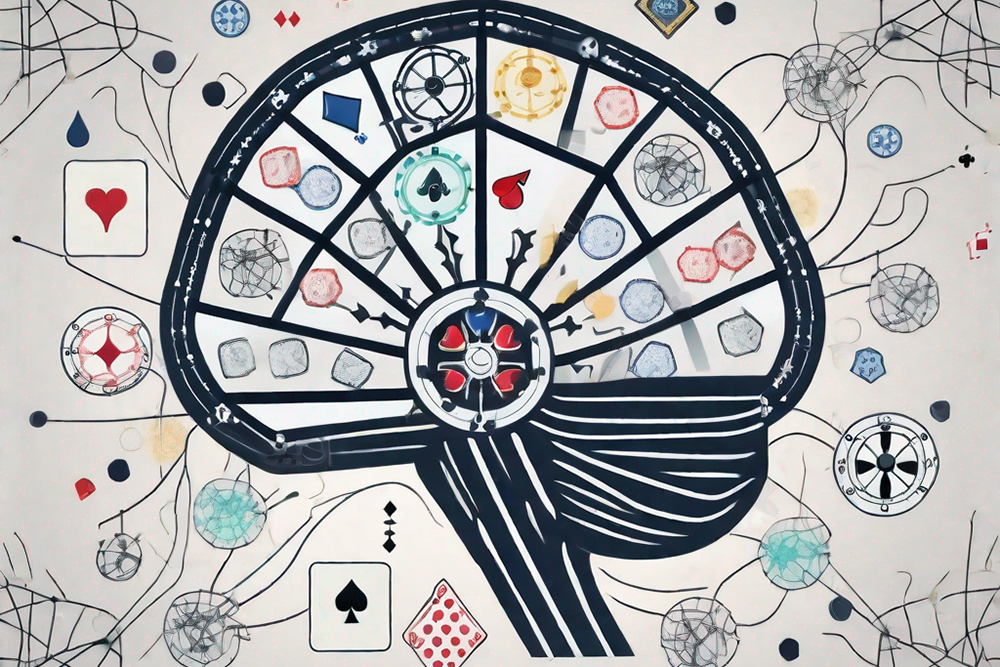Gambling is a complex behavior that has intrigued scientists and researchers for decades. The allure of the casino, the thrill of the bet, and the potential for big winnings have captivated millions of people worldwide. But what lies behind this seemingly innocent pastime? In this article, we delve into the scientific insights into the psychology of gambling. By understanding the gambler's mind, exploring the biological basis of gambling addiction, and examining psychological theories, we can gain a deeper understanding of this fascinating phenomenon.
Understanding the Gambler's Mind
When it comes to gambling, the mind of the gambler operates differently from that of a non-gambler. One of the key factors at play is the role of dopamine in gambling. Dopamine is a neurotransmitter associated with reward and pleasure. When we engage in activities that bring us pleasure, such as eating delicious food or engaging in enjoyable social interactions, our brain releases dopamine. This release of dopamine creates a pleasurable sensation, reinforcing the behavior that led to its release.
In the context of gambling, winning becomes the reward that triggers the release of dopamine. The anticipation of winning, the thrill of taking risks, and the possibility of hitting the jackpot all contribute to the release of dopamine in the gambler's brain. This surge of dopamine creates a sense of euphoria and excitement, which can be highly addictive. It is this addictive nature of gambling that can lead individuals to engage in excessive and problematic gambling behavior.
However, it is not just the promise of reward that drives people to gamble. Cognitive distortions also play a significant role. These distortions are faulty thinking patterns that can lead individuals to overestimate their chances of winning or to believe in patterns or systems that do not actually exist. For example, the gambler's fallacy is the belief that an outcome is more likely to occur because it has not happened recently. This fallacy can lead gamblers to make irrational decisions based on the false belief that they are due for a win.
Furthermore, the availability of gambling opportunities and the accessibility of online gambling platforms have made it easier than ever for individuals to engage in gambling activities. The convenience and anonymity of online gambling can contribute to the development of gambling problems, as individuals can gamble from the comfort of their own homes without the social stigma associated with traditional brick-and-mortar casinos.
In addition to these psychological factors, stress and anxiety can also influence gambling behavior. Many individuals turn to gambling as a form of escape or to alleviate negative emotions. The excitement and distractions offered by the casino can provide temporary relief from stress and anxiety. However, this relief is often short-lived and can lead to a cycle of increased gambling to cope with negative emotions, ultimately exacerbating the problem.
Moreover, the social aspect of gambling can also be a significant factor in its appeal. Casinos and gambling establishments often create an environment that is designed to be enticing and captivating. The bright lights, energetic music, and lively atmosphere can create a sense of excitement and camaraderie among gamblers. This social aspect of gambling can make it more appealing and can contribute to the development of gambling problems, as individuals may feel a sense of belonging and acceptance within the gambling community.
It is important to recognize that gambling can have serious consequences for individuals and their loved ones. Excessive gambling can lead to financial difficulties, strained relationships, and even mental health issues such as depression and anxiety. Understanding the factors that contribute to gambling behavior can help individuals make informed decisions and seek help if needed.
The Biological Basis of Gambling Addiction
Gambling addiction is a complex disorder that involves both genetic and environmental factors. Studies have shown that certain genetic factors can predispose individuals to develop a gambling addiction. These factors can influence how the brain's reward system responds to gambling stimuli, making some individuals more susceptible to developing an addiction.
But what exactly are these genetic factors? Well, researchers have identified specific gene variations that are associated with an increased risk of developing a gambling addiction. One such gene is called the dopamine D2 receptor gene, which plays a role in regulating dopamine levels in the brain. Variations in this gene can affect how the brain's reward system functions, making individuals more prone to seeking out pleasurable experiences, such as gambling.
Speaking of the brain's reward system, it plays a crucial role in gambling addiction. When a person engages in gambling activities, the brain's reward pathways are activated, releasing dopamine and creating a pleasurable sensation. This reinforcement of pleasurable feelings can strengthen the association between gambling and reward, making it difficult for individuals to resist the urge to gamble.
But why does gambling have such a powerful effect on the brain's reward system? Well, it turns out that gambling activates the same neural pathways that are involved in other addictive behaviors, such as drug or alcohol addiction. These pathways are part of a complex network of brain regions that work together to regulate emotions, motivation, and decision-making.

Neurological changes have also been observed in chronic gamblers. Research has shown that long-term gambling can lead to structural and functional changes in the brain, particularly in areas involved in decision-making, impulse control, and reward processing. These changes can further perpetuate addictive behavior and make it challenging for individuals to break free from their gambling habits.
One specific brain region that is heavily implicated in gambling addiction is the prefrontal cortex. This region is responsible for executive functions, such as planning, decision-making, and impulse control. In individuals with a gambling addiction, the prefrontal cortex may become less active, leading to impaired decision-making and an increased susceptibility to impulsive behavior.
Furthermore, research has shown that individuals with a gambling addiction may also have abnormalities in the brain's reward circuitry. Specifically, there may be an imbalance in the levels of dopamine, a neurotransmitter involved in pleasure and reward. This imbalance can contribute to the intense cravings and compulsive behavior seen in gambling addiction.
It's important to note that while genetic and neurological factors play a significant role in gambling addiction, environmental factors also contribute to its development. For example, exposure to gambling at an early age, peer influence, and the availability of gambling opportunities can all increase the risk of developing a gambling addiction.
In conclusion, gambling addiction is a complex disorder that involves a combination of genetic, neurological, and environmental factors. Understanding the biological basis of gambling addiction can help inform prevention and treatment strategies, ultimately improving the lives of individuals affected by this debilitating condition.
Psychological Theories on Gambling
In addition to the biological aspects of gambling addiction, several psychological theories help explain why people engage in gambling behavior. One such theory is the illusion of control. Gamblers often believe that their skills or actions can influence the outcome of a game. They may develop an exaggerated sense of control over the game, even when it is purely based on chance. This illusion of control can be a potent motivator, leading individuals to continue gambling despite negative outcomes.
Another psychological phenomenon that affects gambling behavior is the gambler's fallacy. This fallacy occurs when individuals believe that the outcome of a future event is influenced by past events. For example, a gambler might believe that the roulette wheel is more likely to land on black if it has been landing on red for several consecutive spins. This irrational thinking can lead to misguided betting strategies and potentially significant financial losses.
Superstition also plays a role in gambling behavior. Many gamblers hold superstitious beliefs and rituals, such as wearing lucky charms or following specific routines before placing a bet. These superstitions provide a sense of control and confidence in an uncertain environment and can influence decision-making during gambling activities.
Treatment Approaches for Gambling Addiction
Fortunately, various treatment approaches exist for individuals struggling with gambling addiction. One effective approach is cognitive-behavioral therapy (CBT), which aims to identify and change unhealthy thoughts, beliefs, and behaviors associated with gambling. CBT helps individuals develop healthier coping mechanisms, improve problem-solving skills, and challenge cognitive distortions related to gambling.
In some cases, pharmacological treatments may be prescribed to assist individuals in managing gambling addiction. Medications such as selective serotonin reuptake inhibitors (SSRIs) and opioid antagonists have shown promise in reducing gambling cravings and preventing relapse. However, medication should always be used in conjunction with therapy and other support strategies.
Self-help strategies can also be effective in addressing gambling addiction. These may include joining support groups, practicing mindfulness and relaxation techniques, setting financial limits, and developing alternative hobbies or interests. Self-help strategies provide individuals with a sense of empowerment and control over their gambling behavior.
In conclusion, the psychology of gambling is a fascinating field that sheds light on the complexities of this behavior. By understanding the gambler's mind, exploring the biological basis of gambling addiction, and examining psychological theories, we can develop strategies to prevent and treat gambling addiction. Whether you are a casual gambler or someone struggling with gambling-related issues, it is essential to be aware of the underlying psychological processes at play. Only through this understanding can we make informed decisions and promote responsible gambling behavior.
Important notice for our readers:
We share objective information about online casinos but do not encourage you to gamble. Gambling involves the risk of losing money and may cause addiction.
If you still decide to play - do it responsibly: set limits, control your budget and remember it's entertainment, not an income source.
Our website is for informational purposes only - the final decision is always yours.
























